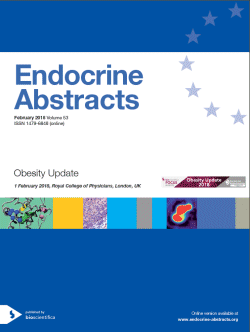Oral Communications
Case Discussions: complex clinical cases 2.0
ea0053cd2.1 | Case Discussions: complex clinical cases 2.0 | OU2018
Eating behaviour and psychological relationship to food following Roux-en-Y Gastric bypass surgery or VLCD intervention: insights into mechanisms of sustained weight loss
Alessimii Haya , Perez-Pevida Belen , Scholtz Samantha , Kenkre Julia , Doyle Chedie , Ahmed Ahmed , Purkayastha Sanjay , Miras Alexander D , Chahal Harvinder , Tan Tricia
ea0053cd2.2 | Case Discussions: complex clinical cases 2.0 | OU2018
Poor responsiveness after bariatric surgery: clinical and eating behaviour characteristics
Perez-Pevida Belen , Aldhwayanand Madhawi , Gibson Rachel , Scholtz Samantha , Miras Alexander D , McGlone Emma , Kamocka Anna , Khan Omar , Greener Veronica , McGowan Barbara , Rubino Francesco , Bloom Steve , Tan Tricia
ea0053cd2.3 | Case Discussions: complex clinical cases 2.0 | OU2018
Surgical revision of candy cane after Roux-en-Y gastric bypass (RYGB)
Kamocka Anna , McGlone Emma Rose , Pevida Belen Perez , Purkayastha Sanjay , Moorthy Krishna , Hakky Sherif , Chahal Harvinder , Tsironis Christos , Miras Alexander , Tan Tricia , Ahmed Ahmed




